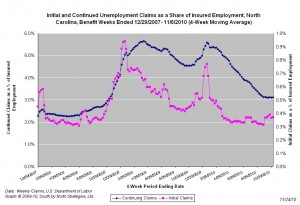NC Unemployment Claims: Week of 11/6
For the benefit week ending on November 6th, 13,564 North Carolinians filed initial claims for state unemployment insurance benefits, and 117,556 individuals applied for state-funded continuing benefits. Compared to the prior week, there were fewer initial and more continuing claims. These figures come from data released by the U.S. Department of Labor.
Averaging new and continuing claims over a four-week period — a process that helps adjust for seasonal fluctuations and better illustrates trends — shows that an average of 13,776 initial claims were filed over the previous four weeks, along with an average of 116,460 continuing claims. Compared to the previous four-week period, there were more initial and continuing claims.
 One year ago, the four-week average for initial claims stood at 18,048 and the four-week average of continuing claims equaled 180,045.
One year ago, the four-week average for initial claims stood at 18,048 and the four-week average of continuing claims equaled 180,045.
While the number of claims has dropped over the past year, so has covered employment. Last week, covered employment totaled 3.7 million, down from 4 million a year ago.
The graph (right) shows the changes in unemployment insurance claims (as a share of covered employment) in North Carolina since the recession’s start in December 2007.
Both new and continuing claims appear to have peaked for this business cycle, and the four-week averages of new and continuing claims have fallen considerably. Yet continuing claims remain at an elevated level, which suggests that unemployed individuals are finding it difficult to find new positions.
Also, little change has occurred within recent months. Since April 2010, the four-week average of initial claims consistently has ranged between 14,075 and 11,200.

 Email Sign-Up
Email Sign-Up RSS Feed
RSS Feed